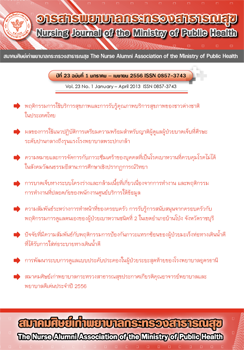การพัฒนาระบบการดูแลแบบประคับประคองในผู้ป่วยระยะสุดท้าย ของโรงพยาบาลอุดรธานี
Main Article Content
Abstract
การศึกษาครั้งนี้มีวัตถุประสงค์เพื่อศึกษาสถานการณ์การจัดระบบการดูแลแบบประคับประคอง เพื่อพัฒนาระบบการดูแลแบบประคับประคองในผู้ป่วยระยะสุดท้าย ในโรงพยาบาลอุดรธานี และเพื่อศึกษาผลลัพธ์การพัฒนาระบบการดูแลแบบประคับประคองในผู้ป่วยระยะสุดท้ายในโรงพยาบาลอุดรธานี โดยใช้แนวคิดวงจรพัฒนาของเดมมิ่ง (Deming cycle) ประกอบด้วย 4 ขั้นตอน คือ การวิเคราะห์สถานการณ์ การวางแผนการปฏิบัติ การดำเนินงาน และการประเมินผล กลุ่มตัวอย่างสุ่มแบบเฉพาะเจาะจง ได้แก่ ผู้บริหารและทีมสหสาขาวิชาชีพ 20 คน พยาบาลระดับปฏิบัติการ 30 คน ผู้ป่วยระยะสุดท้าย 30 คน ผู้ดูแลหลัก 30 คน ที่เข้ารับการรักษาตั้งแต่ เดือนตุลาคม 2553 ถึง สิงหาคม 2554 รวม 110 คน เครื่องมือที่ใช้ในการวิจัย ประกอบด้วยคู่มือระบบการดูแลผู้ป่วยแบบประคับประคองในระยะสุดท้าย และเครื่องมือที่ใช้ในการเก็บรวบรวมข้อมูล ได้แก่ 1) แบบสัมภาษณ์กึ่งโครงสร้าง 2) แบบสังเกตพฤติกรรม 3) แบบสอบถามความพึงพอใจผู้ให้บริการ และ 4) แบบสอบถามความพึงพอใจของครอบครัว ซึ่งผ่านการตรวจสอบความตรงตามเนื้อหาจากผู้เชี่ยวชาญและทดสอบความเชื่อมั่นโดยวิธีสัมประสิทธิ์แอลฟาของครอนบาค มีค่าเท่ากับ .91 และ .95 ตามลำดับ วิเคราะห์ข้อมูลโดยใช้สถิติพรรณนา ได้แก่ ความถี่ ร้อยละ และส่วนเบี่ยงเบนมาตรฐาน
ผลการศึกษา ระบบการดูแลผู้ป่วยแบบประคับประคองในระยะสุดท้าย ซึ่งพัฒนาจากทีม สหสาขาวิชาชีพ ประกอบด้วย คู่มือการดูแลแบบประคับประคองในผู้ป่วยระยะสุดท้าย ระบบการส่งต่อผู้ป่วยระยะสุดท้ายจากโรงพยาบาลสู่ชุมชนในเครือข่าย ผลการวิจัยพบว่าด้านผู้ป่วยได้รับการดูแลครอบคลุมองค์รวมมากขึ้น ความพึงพอใจของครอบครัวต่อการดูแลแบบประคับประคองในผู้ป่วยระยะสุดท้ายโดยรวมอยู่ในระดับมาก (=4.60, SD±.498) ด้านผู้ให้บริการความพึงพอใจต่อระบบการดูแลแบบประคับประคองในผู้ป่วยระยะสุดท้ายโดยรวมอยู่ในระดับมาก (
=4.09, SD±.565) พยาบาลมีการปฏิบัติตามระบบการดูแลที่พัฒนาขึ้นร้อยละ 91.68 ผลการศึกษาครั้งนี้สรุปว่า การพัฒนาระบบการดูแลแบบประคับประคองในผู้ป่วยระยะสุดท้าย ทำให้เกิดผลลัพธ์ที่ดีต่อผู้รับบริการ ดังนั้นควรนำระบบดังกล่าวไปกำหนดเป็นนโยบายในการดูแลผู้ป่วยระยะสุดท้ายครอบคลุมทั้งเครือข่ายต่อไป
คำสำคัญ : การพัฒนาระบบ, การดูแลแบบประคับประคอง, ผู้ป่วยระยะสุดท้าย
The Development of the Palliative Care System for End of Life Patients at Udonthani Hospital.
Tussanee Tasprasit* Phimolrat Phimdee** Sasipin Mongkolchai** Paungpayom Jullapan** Yupayong Puttatum**
ABSTRACT
The purposes of this study were to assess the situation of palliative care management, to develop the palliative care system for end of life patients at Udonthani Hospital, and to evaluate outcome of the palliative care system by using Deming Cycle. This cycle composed of 4 steps: Plan, Do, Check, Act. The purposive sampling was used. One hundred and ten samples were divided into 4 groups: 20 administrators, 30 nurses, 30 end of life patients, and 30 care givers who was treated during October 2009 to August 2010. The operational instrument was the guideline of palliative care system for end of life care patients. The research instruments composed of 4 parts: 1) Semi-structure interview form 2) Behavioral observation form 3) Health care providers’ satisfaction questionnaire and 4) Family Satisfaction questionnaires. The Cronbach Alpha Co-efficiency reliability of health care providers’ satisfaction questionnaire was .91 and family satisfaction questionnaire was .95. Data were analyzed by frequencies, percentage, and standard deviation.
The result reported that the palliative care system for end of life care patients which developed by multidisciplinary team composing of the guideline of palliative care for end of life care patients and the referral system for end of life care patients from hospital to community. After using this palliative care system, the patients were treated with more holistic approach, the overall satisfaction of family was high (=4.60, SD±.498), the health care providers’ satisfaction was also high (
=4.09, SD±.565). There were 91.68% of behaviors that nurses were able to do following the guideline of palliative care for end of life care patients.
This result of study indicated that developed palliative care for end of life care patients increase positive outcome of end of life care patients. Therefore, this system should be generalized to all other settings.
Key word : development of system, palliative care, end of life.
* Registered Nurse, Senior Professional Level, **Professional Level, Udonthani Hospital.Article Details
บทความและรายงานวิจัยในวารสารพยาบาลกระทรวงสาธารณสุข เป็นความคิดเห็นของ ผู้เขียน มิใช่ของคณะผู้จัดทำ และมิใช่ความรับผิดชอบของสมาคมศิษย์เก่าพยาบาลกระทรวงสาธารณสุข ซึ่งสามารถนำไปอ้างอิงได้

